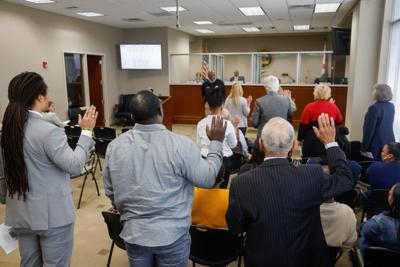Several criminal justice reform organizations want new parole guidelines under consideration by the Alabama Board of Pardons and Paroles to use a scoring system that puts more weight into an applicant’s rehabilitation efforts than the original crime.
The proposed guidelines, made available to the public in the latter part of May after years of delays, would guide the board’s decision in determining an applicant’s fitness for parole.
“The modifications that we suggest are more in line with a parole board that is trying to accomplish the mission of reintegrating people who are ready to get back into society and rebuild their lives,” said Dev Wakeley, a policy advocate with Alabama Arise who provided input regarding the comments. “We all know that the parole board has had major issues over the last several years particularly, and we want to make sure the updated guidelines become a way to make positive changes instead of paper over the real problems that we have seen.”
The guidelines — which are not binding on the board’s parole decisions — operate on a point system in which more points mean less likelihood of a parole applicant getting parole. Those who receive at least 9 points based on the proposed updated guidelines are recommended to be denied parole.
Some sections of the parole guidelines remained the same, while others were changed in a manner that further limits the potential for applicants to be granted parole.
The proposed guidelines recommend issuing points based on the severity of the offense, with one point for less-severe ones and four points for those that are “very high.” The current point system has three categories, with offenses that are low severity given zero points while those that are considered the most severe are assigned two points.
The proposed guidelines do not issue any points for people without any discipline issues within the past year, but impose a five-point penalty if the applicant had two or more disciplinaries that included violence in the past 12 months.
The Southern Poverty Law Center, Alabama Arise, and the ACLU of Alabama collaborated on a single review while staff from Alabama Appleseed submitted their comments separately. Both groups proposed reducing points for specific sections, including the severity of the original offense.
SPLC and ACLU of Alabama recommended that offenses with low severity not be given any weight while the most severe crimes are designated two points.
“The parole hearing application process is not a forum to relitigate the underlying offense — the sentence the applicant is currently serving,” the groups wrote in their submission. “The process is meant to assess and determine the individual’s ‘status’ of rehabilitation. That said, ‘low’ offense severity has been shown to be a statistically significant positive indicator of fitness for release and accordingly should not result in a negative consequence for petitioners.”
Alabama Appleseed recommended that the parole board return to the previous scoring system that considers the severity of the offense.
“Our experience in Alabama backs up what the research shows: conviction of a more serious offense does not equate with increased risk of reoffense on parole and risk to public safety,” Alabama Appleseed said in its statement.
Behavior behind bars
SPLC, Alabama Arise and the ACLU of Alabama also want to give point reductions to parole applicants without infractions in the prior year and max out points for those offenses at four, while providing mitigation for incidents that applicant did not instigate.
“Given the undisputedly violent conditions inside Alabama’s correctional facilities, it would be unreasonable and cruel to house individuals in these settings and then punish them for defending themselves by assessing points for the mere act of survival,” they said in their proposed changes.
Alabama Appleseed proposed subtracting a point for applicants without any disciplinary infractions for at least the past three years and giving additional credit for longer periods without violations. It also suggested imposing three points for those with at least one disciplinary infraction that involved violence for the past 12 months and four points for applicants with multiple violent offenses. In both cases, the applicants should have instigated the violent incident.
“The ability to follow strict institutional rules and avoid conflict with other individuals in overcrowded, unairconditioned, dilapidated, understaffed prisons and avoid disciplinaries year after year is a strong indicator that someone has developed the skills and character to do extremely well outside of prison,” Appleseed staff wrote.
Additionally, Alabama Appleseed wants to expand the number of programs that give people who have been incarcerated credit if they participate, and impose not more than one point for those who have not secured housing or a job as part of their reentry plan, while allowing a one-point credit for those who have included housing or job arrangement.
The proposed parole guideline allows the parole board to issue two points for applicants who have not made any effort to put forward a reentry plan.
“It seems blatantly unfair to penalize incarcerated individuals for their inability to secure housing while in prison when a statewide commission has cited gaps in the state’s own provision of services as a reason for the struggles accessing housing,” Alabama Appleseed said in the comments.
Community input
Advocates also weighed in on the influence of community input.
The group that included Alabama Arise, SPLC and the ACLU of Alabama want the parole guidelines to remove a point if no one in the community opposes applicants getting parole, but points would be imposed if the public opposed parole.
Alabama Appleseed wants a point system that is based on input from those who are more familiar with the applicant. Applicants would get a one-point reduction if representatives from the Alabama Department of Corrections or a parole officer supported individuals getting granted parole, for example. Points would be imposed if there was opposition from law enforcement or advocacy groups, with more assessed if the victim or victims opposed parole.
The public comment period will last for the next few weeks at which point a legislator can request that the Legislative Council review the proposed guidelines and can either accept, amend or reject them.
The parole board published the updated guidelines several weeks after the Alabama Legislature approved an amendment offered by Sen. Clyde Chambliss, R-Prattville, that made funding for the parole board contingent on the members updating the guidelines.
This story is from alabamareflector.com.

















(0) comments
Welcome to the discussion.
Log In
Keep it Clean. Please avoid obscene, vulgar, lewd, racist or sexually-oriented language.
PLEASE TURN OFF YOUR CAPS LOCK.
Don't Threaten. Threats of harming another person will not be tolerated.
Be Truthful. Don't knowingly lie about anyone or anything.
Be Nice. No racism, sexism or any sort of -ism that is degrading to another person.
Be Proactive. Use the 'Report' link on each comment to let us know of abusive posts.
Share with Us. We'd love to hear eyewitness accounts, the history behind an article.